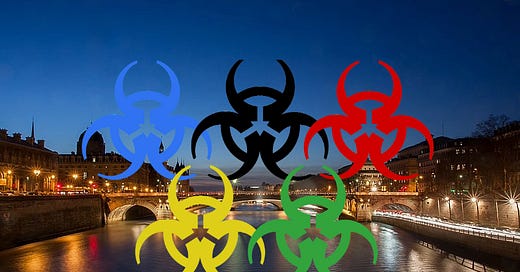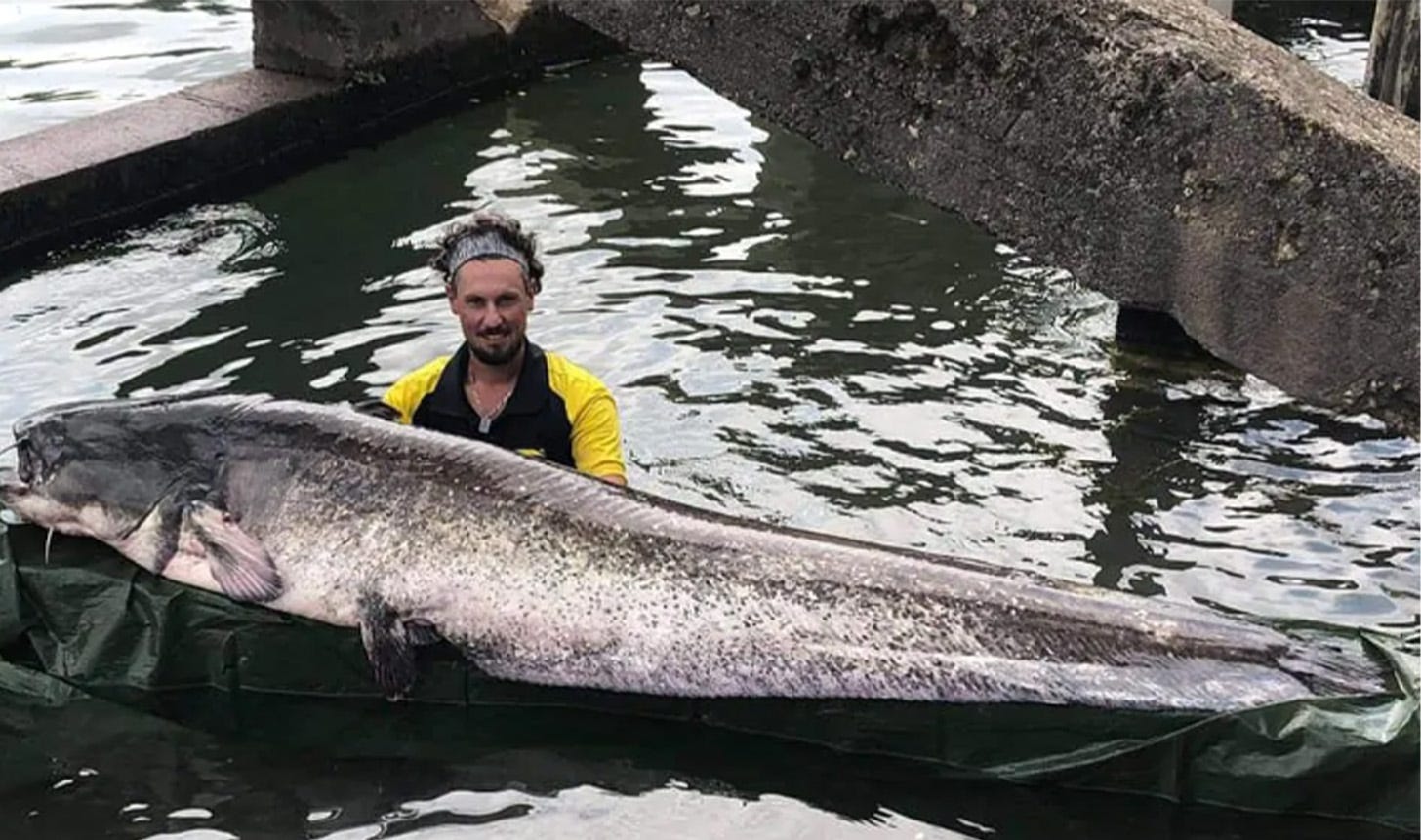The 2024 Summer Olympics in Paris are almost upon us and, you’re not gonna believe this, but it’s looking like they might be absolute chaos.
We talk about a bunch of reasons why, including a massive bed bug outbreak and the potential for unprecedented violence, on this week’s episode of the You Don’t Even Like This Show podcast.
You should listen to it sometime! Maybe even today! Later, though, because there is one huge concern surrounding the summer games that we don’t talk about on that episode.
To put it bluntly, 2024 Olympic athletes might be swimming in toilet water.
That shouldn’t come as a huge surprise. Just like the past three host city Summer Olympics headquarters (including Paris) have all been raided by police, the bodies of water used for outdoor aquatic events at those same three Summer Olympics are all accused of being absolutely filthy with human waste.
In Rio (2016) and Tokyo (2021) the swimming marathon and the swimming portion of the triathlon still happened despite pollution concerns. Does that mean both hosts cleaned up their water in time? Nah, not really. Rio’s water is still gross and Tokyo Bay probably still is too. Where there’s people and industry, there’s pollution. This is likely to continue to be a problem at every Summer Olympics for time eternal.
Things seems a little more dire in Paris, though.
You probably know that the Seine River is one of the most visually stunning landmarks in Paris this side of that stupid decommissioned radio tower that everyone loves so much.
But did you know it’s also a pollution-addled cesspool that’s been closed for public swimming since 1923? It was declared biologically dead in the 1960s. In other words, it’s so heavily polluted no life can survive in its waters.
There have been various efforts to clean it up over the years. In 1990, Paris Mayor Jacques Chirac was famously quoted as saying:
“In three years, I will swim in the Seine, in front of witnesses, to show that the Seine has become a proper river.”
It did not become a proper river, at least not in time for Jacques Chirac to take a public dip. On the bright side, current Paris Mayor Anne Hidalgo and French President Emmanuel Macron have both vowed to do the same before the Olympics kick off in late July.
That’s probably not gonna happen either, and even if it does, it still won’t necessarily mean the water is safe.
People were more than a little surprised when Paris made the Seine the centerpiece of their 2024 Olympic plans because, again, it’s been closed to swimmers for more than a century on account of human excrement concerns.
No worries, though, because part of those plans included earmarking one billion fancy European dollars to not only make the Seine usable for Olympic athletes, but also to generations of Parisians for recreational swimming thereafter.
To be fair, water conditions have improved over the years, as evidenced by this completely normal boat-sized catfish a guy pulled out of the Seine recently.
According to the Washington Post, around 99 percent of the Paris region’s wastewater is treated now, a vast improvement over the 40 percent that was being treated back in the 1970’s. That change, along with various regulations that have been put in place since the ‘80s, means pollution levels in the Seine are well below safe swimming levels on a lot of days now.
That all changes when it rains.
Unlike the spry and youthful United States, the country of France has been around for an absurdly long time. That means, among other things, that they’re working with a borderline ancient sewer system in a lot of areas (as opposed to America’s litany of modern but still dangerously useless sewer systems). When the vast network of tunnels that make up that sewer system get overwhelmed with rain water, everything in those tunnels gets released into the Seine. Rain water, sink water, toilet water …
… you name it.
As of May 2023, that was happening at a rate of about 12 times per year in Paris. A giant underground storage tank is being constructed that will, hopefully, cut the number of those occurrences to two per year, but if that project will be completed in time to benefit the Olympics seems to still be a little unclear.
Another concern is the approximately 20,000 homes in the suburbs of Paris that have residential sewer systems that deposit human waste directly into the Seine. The only way to deal with that is to go door to door and ask homeowners if they’d be cool with having their yards dug up so their sewer systems can be replaced, even though they’re probably working fine aside from polluting the planet. So far, around 5,000 have agreed.
Paris started working on this accelerated effort to get the Seine’s shit together at least as far back as 2021. So … how’s it going?
Not great! As recently as April, Paris 2024 President Tony Estanguet said during a press conference that he was “confident that it will be possible to use the Seine” for the Olympics, but also that there could be a scenario where “we could not swim.”
It has also been made clear that there is no Plan B. Either the water is clean enough to swim in, or outdoor swimming events will be canceled. That means no swimming marathon, and the triathlon would be a duathlon that skips the water part.
Will it really come to those extremes? Yeah, probably. A short couple of days after Estanguet expressed his almost confidence in the prospects of using the Seine for sports this summer, an environmental group called the Surfrider Foundation delivered some bad news.
After analyzing six months of test results taken between September 2023 and March 2024, they found “alarming” levels of double and sometimes triple the maximum permitted amounts of E. Coli and enterococci. Those are both indicative of fecal matter contamination in water.
Paris officials pointed out that the tests were conducted during an especially wet winter so all of that rain influenced the test results. That would be a valid objection if not for a few crucial details.
For starters, swim marathon test events that were scheduled to happen in the Seine in August 2023 had to be canceled because of unsafe pollution levels. Those are objectively not winter months.
Also, at least according to this chart on a travel website, the last two months of winter are the least rainiest months of the year in Paris.
So who cares if those tests were conducted during the winter?
Meanwhile, July is one of the rainiest months. That matters a lot when you take it in context with some other troubling test results.
Fluidion, a tech company that develops water testing products, is one of the various contractors who’ve been tasked with monitoring pollution levels in the Seine in preparation for the Olympics. They shared test results with NBC News that showed E. Coli levels that were 2.5 times higher than what’s considered safe for swimming.
CEO Dan Angelescu tried to ease the blow with this quote:
“In the summer when there is a lot of sunlight, when the water flow, river flow rate is really low, and when there is no rain for several weeks, let’s say two or three weeks without rain, you can actually reach really good water quality conditions.”
Oh, is that all we need? Just three consecutive weeks of no rain during one of the rainiest months of the year in Paris? Sounds like a safe bet to me!
CEO Dan then continues his tradition of cloaking bad news in good news with this quote:
“You may swim in very polluted water and nothing may happen to you, or you may swim and you may develop itches, or you may develop infections, or you may catch a strain of E. Coli that may be pathogenic.”
Personally, I think he could’ve skipped the “nothing may happen to you” and maybe even the “you may develop itches” part. What matters is that you might die. That’s what “a strain of E. Coli that may be pathogenic” means, right?
Right. Later in that same interview, he adds that you “could get certain diseases that can really kill you.”
Not just kill you. REALLY kill you. That’s way worse than getting regular killed.
It would be one thing if CEO Dan was saying that five years ago, but he’s saying it with a scant ten or so weeks until the games of the MMXXIV Olympiad are due to start.
Despite years of labor and billions of euros spent, it seems like whether or not outdoor water sports actually happen in these Olympics and/or if the participants in those events survive unscathed will come down to if and when it rains in Paris.










Nicely done.
Never has “eau de toilette” been so literal.
Imagine all the training a swimmer endures; the total regimentation; the 10,000 calories per day training sessions; then it all comes down to swimming in mega catfish spawning potty water.
I picture U.S. Olympic Team swimmers being like, “What do you mean we’re not training in Colorado Springs this time?” And the swim coach being like, “Yeah, you guys are just gonna have to trust me on this one. I’m sending you all down to Mexico instead to, uh, ‘acclimate’ to the same conditions you’ll be facing once you get to Paris.”